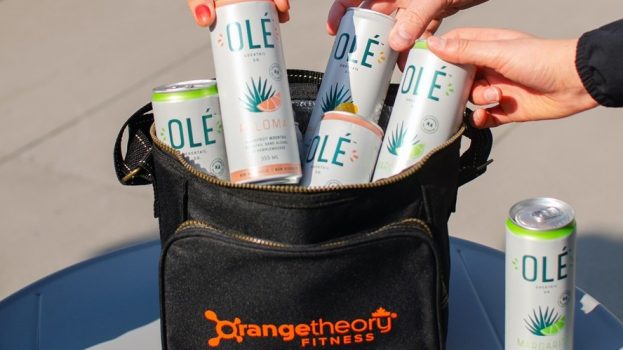It’s Sept. 6 at The Docks nightclub in Toronto. Clubgoers patiently tolerate a brisk late summer breeze as they wait in a long lineup. Once through the doors, they are invited to have their drivers’ licences swiped by dolled-up young women in exchange for a free CD, featuring the likes of DJ Laflèche and Lil Devious. Like all the signage in the place, the gold-coloured CD cover is branded by Benson & Hedges, and carries the tagline ‘expect more…’
Inside the dark venue, the 19-to-24 crowd, which covers three-quarters of the vast dance floor, can purchase their smokes from skimpily clad girls who carry sleek trays of cigarette cartons under lit plexiglass.
This is a Benson & Hedges Gold Club Series event, and it’s typical of how tobacco was advertised until the end of last month: under the radar, underground and far from the prying eyes of anti-smoking activists and government.
Even this kind of activity – ostensibly aimed at simply converting smokers over 19 to switch brands and perfectly legal at the time – was restricted on Oct. 1 by Bill C-71 (see sidebar, p. 7). But that doesn’t mean the tobacco marketers are going to give up on marketing altogether.
While branded sponsorship was the latest asset wiped out of their arsenal by Bill C-71, there are indications – such as Imperial Tobacco’s recent creation of two new marketing subsidiaries – that other tactics will continue. And many industry participants, including Imperial president and CEO Bob Bexon, suggest other marketers who are currently under fire from public critics, like fast food and alcohol manufacturers, can learn from the experience of big tobacco.
In a speech to L’Association Marketing de Montreal last March, Bexon warned: ‘The social virus was created in the tobacco control laboratory but it is going to spread,’ and suggested that other firms should consider Imperial’s marketing efforts as a model for dealing with criticism.
He’s not just blowing smoke; the industry players have been ‘extraordinarily successful in marketing themselves,’ according to Anne Lavack, associate professor of marketing at the University of Regina, who has been carefully studying the category.
The most recent example of this resolve can be seen in the conception of Imperial’s new marketing subsidiaries, Channel 2 and Rumbling Walls Events. The former was created to ‘find non-traditional venues for product displays,’ such as bars. Meanwhile, Rumbling Walls, which owns the Definiti and Rev brand names, will provide integrated marketing services through its magazines, Web sites, and events. Other companies can promote their product through the various media, but particularly interesting is the fact that Channel 2 can also take advantage of product display opportunities at adult-only locations for Imperial brands such as Matinee, Players and DuMaurier.
Canada’s third tobacco giant, Toronto-based JTI-MacDonald (which owns the Export A brand) has also been busy with programs similar to the nightclub events organized by Rothmans Benson & Hedges: overall, in fact, the estimated total ad spend for the category last year was just over $22 million, according to Toronto-based Nielsen Media Research.
Certainly the likes of the Gold Club Series appear to have aided the Benson & Hedges brand; according to its 2002 annual report, the company continues to lead the big three in the domestic fine-cut market with 55.7% share.

‘I think the bar promotions are very successful at reaching consumers in the 19-to-24 age group,’ says Lavack. ‘People have reduced inhibitions because they have been drinking – and it’s very easy for non-smokers to become party smokers.’
Lavack agrees that other marketers can learn from tobacco, although she emphasizes that some of these products aren’t necessarily as harmful to one’s health. In particular, she says other categories should look at how tobacco marketers leveraged their sponsorship associations in the past. ‘They pre-promoted events extensively; they made sure that everyone knew about the event, and everyone knew they are a sponsor. They post-promoted and spent time and money telling consumers that they were a sponsor.’
There have been other benefits to sponsorship as well. Explains Daniel Robinson, a media studies professor at the University of Western Ontario: ‘[University] students assume [tobacco sponsorship ads] are ads for those brands…. They aren’t aware of the distinction.’ Another positive outcome is that ‘there’s goodwill that comes from that [form of advertising].’ In other words, sponsorship has helped tobacco ‘burnish their public image, by providing favourable public relations in their corner, versus what’s in the other corner – government and an antagonistic public towards the health risks of smoking.’
Amazingly, despite the Oct. 1 clampdown, in the case of JTI-MacDonald, the plan is to continue with sponsorship, even though it will have to be unbranded from now on.
Why bother? ‘On site at the events, we will continue to be allowed to sell our product,’ explains VP marketing Christian Guay. ‘Because our business is about growing market share, and by definition that means converting a competitive smoker [one who uses another brand] to your brand, I need to continue to have that interaction with consumers and give them a chance to try my brand and hopefully adopt it.’
JTI has had two main sponsorship platforms mostly targeted at 19- to 24-year-old males for its Export A brand: The Extreme Sports Series and The Extreme Music Series. The first incorporates action sports like motocross racing and wakeboarding, and the second involves the sponsorship of alt rock concerts in bars. Guay says the company stays away from any activities that would bring the brand too close to an under-19 crowd. The link with rock music and extreme sports, he adds, communicates that Export A is about ‘energy’ and ‘attitude.’
The series have been promoted in urban weeklies (according to the Act, tobacco manufacturers can advertise in magazines with 85% adult readership and this rule was in place before the Oct. 1 amendments), on the Web sites extremesportsseries.ca and extrememusicseries.ca, and to a 500,000-strong database of adult smokers, who have given permission. JTI runs roughly 40 extreme sports series and over 100 music programs annually, with between 5,000 to 40,000 attendees at the sports events and between 250 and 2,000 showing up for concerts, depending on the venue.
Another promotional vehicle JTI relies on is its 360 magazine, published by Toronto-based WSP International. It’s a Maxim-type three-times-a-year pub with a circulation of 250,000 and a focus on girls, action sports and music. Until Oct. 1, Export A could run ads in the magazine, created by FCB Toronto, with copy conveying the excitement of action sports, and by association, the brand. For instance, one ad read: ‘Sure, it’s all a blur. That’s the point.’ The Extreme Series logo is visible, as is the logo for Export A.
But while Bill C-71 permits product advertising, it bans lifestyle creative, which means these ads will be dropped. However, like the events themselves, 360 will continue – without the ads, although the ‘series’ can still be promoted. Says Guay: ‘[The magazine] is one way to communicate with consumers…. Obviously we see value [in it]. We’ve built great relationships over the year with communities and athletes that have benefited from financial contributions…. The other thing that’s key, as far as we’re concerned, is that we strongly believe in our right to communicate a message to our consumer, being adult smokers.’
So far, JTI-MacDonald’s efforts have been worthwhile. According to Guay, Export A’s market share has increased about five share points in the past year. He adds: ‘there’s obviously relevance in the message of action sports.’
Imperial Tobacco has also significantly improved its market share. Its marketing strategy consists of sponsoring in-bar events and publishing promotional magazines, as well as its retail and packaging efforts.
In the speech to L’Association Marketing de Montreal, Bexon pointed out that while the whole category is in decline – the percentage of smokers in Canada dropped from 50% in 1965 to 21% last year – Imperial now has a 71% market share in the premium cigarette category. In 2002, the firm reported it had a 62% share of the domestic cigarette market; that’s a significant improvement from the ’80s, when the company had only a 46% market share.
In total, says Bexon, Imperial’s operating income has increased from $156 million to ‘slightly north of a billion dollars’ – a compound annual growth of almost 10% – between 1981 and 2002.
Marketing has boosted the business, he says, aided by a healthy dose of research. Every month, Imperial asks about 2,000 adult smokers to provide information on brand usage and brand switching, as well as new product awareness and purchase location. It also measures brand perception awareness and interaction for almost every brand in the domestic cigarette market each year. Says Bexon: ‘Once an opportunity to better serve is identified we…take possible solutions back out to consumers to ensure that we are satisfying their needs.’
However, to comply with the Act, Imperial has instituted some changes. While it will continue to sponsor Paul Tracy and the Players racing team for the rest of year, branding has been removed from the cars, and a promotional Web site, teamplayers.ca, will cease to exist altogether. Says Neil Blanche, division head of marketing communications: ‘The pure race fans will know we’re still affiliated, and will continue to know, which is probably still a positive, but we won’t benefit from any branding.’
Similarly, another initiative, Redseat.ca, which promoted sponsored concerts in bar venues, was phased out because of its connection with duMaurier. ‘Redseat was never a tobacco product, but our legal opinion is that…there could possibly be an association that’s been formed.’
However, Rumbling Walls’ new Web site, definiti.ca, is also aimed at the clubgoer. Tobacco brand names are conspicuously absent, but red is still the dominant colour and there is a list of upcoming events, as well as the opportunity to sign on as a ‘club member.’
Says Blanche: ‘We’re exploring different things; we’re looking at all the tools at our disposal. We’ll look to see if there is still any value in driving consumers to retail stores or adult-only locations.’
And Imperial’s magazines will still be published and mailed to customers for now, albeit under its new subsidiary Rumbling Walls. Rev is yet another Maxim-inspired pub and Definiti (formerly Pursuit), is targeted at the nightclub set, with circulations of 120,000 and 140,000 respectively.
‘You can keep them – but you can’t put any tobacco branded elements inside, there’s no sponsorship ads, and there’s no brand preference advertising [so] the question is, what is the value of the magazines in the future?’ says Blanche. The answer? There is a value to the consumer, and the pubs can keep the database fresh. ‘If you’re going to continue with a database, you need to make sure it’s up to date, and one way to do that, if you ever need to use it for certain activities, is to provide something of value.’
Lavack believes the tobacco giants will continue to market their brands effectively even under the new restrictions. ‘Every time the legislation changes, the tobacco industry has found ways to [adapt to] it.’
Imperial, for one, views the restrictions as simply change, which ‘brings opportunities,’ says Bexon. ‘All of these restrictions have had an impact on how companies develop and promote their products, and therefore how they develop their competitive advantages.’
The skinny on Bill C-71
What tobacco companies can and can’t do as of Oct. 1:
* Tobacco companies can donate money to organizations and events. However, they cannot be listed as an official sponsor, nor can they do any sponsorship advertising. Even on-site signage is banned.
* Tobacco products may be placed on display in adult-only locations, but consumers cannot handle the product before paying for it.
* Advertising in magazines with an adult readership of at least 85% is permitted. (At least 85% of their readership is aged 19-plus.) However, the Act forbids ‘lifestyle’ advertising, which is defined as an ad that ‘associates a product with, or evokes a positive or negative emotion…’
* Direct mail geared at verified adult smokers is permitted.
* A violation of the Tobacco Act could result in a fine of up to $300,000 per day and a two-year prison term for a senior executive.























